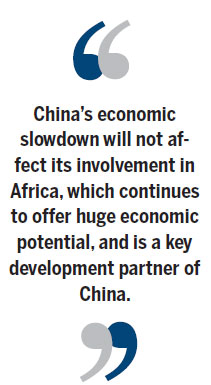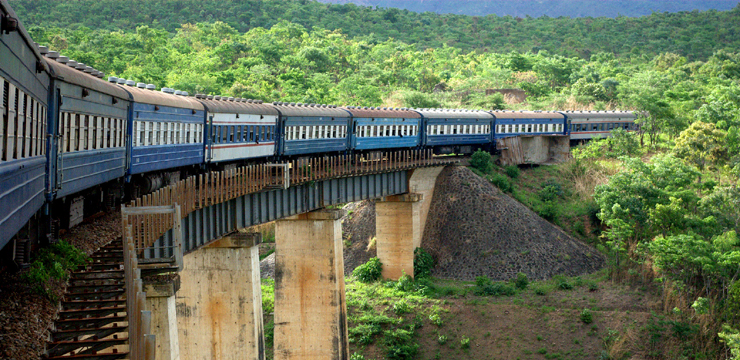
China's presence part of the landscape
Updated: 2014-05-02 09:24
By Giles Chance (China Daily Africa)
Comments Print Mail Large Medium SmallChinese slowdown will not dampen its enthusiasm for the continent
It is now accepted, not least by the Chinese government, that Chinese economic growth has reached a new, lower range of somewhere between 7 percent and 8 percent. Of course, this growth rate could fall further in the years ahead. Does this mean China's global impact will start to diminish significantly? The question is particularly significant for countries in sub-Saharan Africa, still one of the poorest places in the world despite cumulative Chinese investment of more than $120 billion over the past decade.
China's slightly lower growth applies to a national economic base that is huge, and getting larger, $9 trillion at the end of last year, according to the International Monetary Fund in Washington, and forecast by 2015 to be nearly $11 trillion. As China continues to grow at a pace that is still fast by any standard, its impact will become ever more significant.
As the mix in China's economy changes as it becomes more marketized, external investment and trade will not slow down. It will accelerate, and this speeding up of China's global interaction will help its trading and investment partners, including Africa.
Since 2003 the importance of Africa's economies to China has been dominated by China's mineral imports and, in the other direction, by China's consumer goods exports to the few African countries with richer middle classes large enough to buy them, led by South Africa, Nigeria and the north African countries. Africa's oil and base metals will remain important to China, but the continued emergence of an African middle-class will become a theme as important in China-Africa trade and investment as mineral extraction.

We can already see from the size of China's commitment to Ethiopia (more than $10 billion in recent investment) that a large local market, combined with an intelligent, low-cost workforce are the important factors for the development of China's investment in African light manufacturing.
A related, equally important question is "Will China's continued investment in Africa lead to a dangerous African dependence on Chinese money?" The answer to this is "It could, but not necessarily". Africa's economic boom has given African countries the chance to put in place permanent organizational structures that can underpin Africa's future development on its own terms.
The fundamentals include: stable, fair government based on freedom of choice, sadly, something that many Africans today can only dream of or read about in history books; sound, well-functioning institutions; good educational systems, from primary school to college; and good physical infrastructure.
Africa's development today has the chance to escape from the failed 1980s African models of structural adjustment that were funded by Western loans and driven by Western agendas, to create new merit-based societies based on African ideas, which can fulfil African desires for a better life. The Chinese recognize that Africa's own development is a matter for Africans themselves, and are happy to support it. The opportunity for Africa is there, and it is for Africans themselves to take it. If the Africans do not, then they will become even more dependent on outsiders for investment and employment than they are today.
The sustained emergence of what economists call endogenous, or home-grown, African growth will play a vital part in driving the Chinese-African relationship, based on a compound growth in annual trade of 26 percent between 1995 and 2012, reaching more than $200 billion in total, from almost nothing 20 years ago.
China's numerous consumer product suppliers can only sell to markets that can afford their goods, and most of the people in sub-Saharan Africa still cannot, cheap though many are. The main obstacle to Africa's continued growth lies not in China, but in Africa's own development.
Whatever happens, though, China will continue to invest in and trade with Africa, partly from necessity, and partly because China sees itself as occupying a vital global position between the large number of poor, developing countries, on one hand, and the world's rich developed countries on the other.
It is important to China, beyond purely economic considerations, that it is friends with the diverse and numerous countries that make up Africa. China's own millions of poor people, and its rich diversity of local customs and traditions give it much in common with African countries.
China's economic slowdown will not affect its involvement in Africa, which continues to offer huge economic potential, and is a key development partner of China. As private companies start to play a more important role in China's evolving economy, many will choose to escape intense Chinese competition by expanding into Africa. China's presence in Africa is a permanent part of the African landscape.
The author is a visiting professor at Guanghua School of Management, Peking University.
(China Daily Africa Weekly?05/02/2014 page7)






